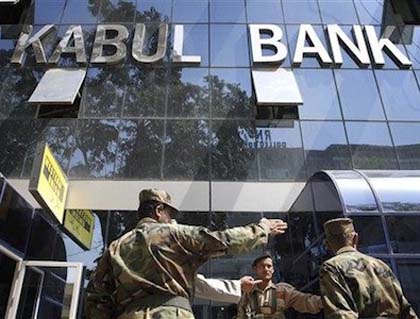A government commission will take more than $570 million in fraudulent loans from Kabul Bank before the rest of the company is offered for sale, central bank Governor Abdul Qadeer Fitrat told reporters yesterday. He declined to say whether the plan had support from the International Monetary Fund, which has withheld loans to Afghanistan pending a solution of the Kabul Bank crisis.
IMF and Afghan officials reached “preliminary understandings” last week on a plan to resolve the Kabul Bank failure and strengthen the Afghan banking system, an IMF spokesman, Raphael Anspach, said in an e-mail reply to questions. The IMF has called for revisions to the existing “banking law to improve corporate governance” among Afghanistan’s 17 commercial banks, an effort that Afghan officials said the cabinet rejected in January.
After Kabul Bank’s illegal loans are handed to the Financial Disputes Resolution Commission, the central bank “is going to privatize Kabul Bank in the next three months by seeking expressions of interest from foreign or Afghan investors,” Fitrat said yesterday.
The government took over Kabul Bank in September as thousands of depositors rushed to withdraw their money upon learning that the bank’s owners had lost funds that a U.S. government report says may total $850 million, or 94 percent of its loans. Some lending paid for luxury homes in Dubai for shareholders, including Mahmoud Karzai, the president’s brother, the Washington Post cited him as saying.
Stricter Law
A stricter law to prevent further bank failures “is still being studied” for reconsideration by a panel named by the cabinet, central bank spokesman Aimal Hashoor said in a phone interview April 18. Karzai legal adviser Nasratullah Stanekzai, who attended a January cabinet meeting that rejected the bill, said a panel hasn’t been named and Karzai’s office isn’t pushing to get the law rewritten.
“We are still waiting for a new proposal from Da Afghanistan Bank,” the central bank, Stanekzai said by phone in Kabul April 19. “We don’t know if they are working on the law and we are not going to intrude on their process.”
The government may be unwilling to slash the powers of bank owners who have helped Karzai and other officials with election campaign money, Kabul University economist Saifuddin Saihoon said in a phone interview. Kabul Bank’s former chairman Sherkhan Farnood organized Dubai fund-raising events for Karzai’s 2009 re-election campaign, the Washington Post reported.
Bank Pressure
The U.S.-backed government is trying to expand the economy and create jobs to undercut the Taliban insurgency. Only 7 percent of Afghanistan’s 30 million people have bank accounts, according to the central bank, which limits the country’s ability to develop its own pool of investment capital.
The new legislation, drafted last year by the central bank, would bar any shareholder from serving as a bank’s chief executive officer or supervisory board chairman, Fitrat said in a Feb. 26 interview. The law would restrict the ability of shareholders to influence their banks’ CEOs or lending decisions, said Fitrat and Justice Minister Habibullah Ghalib.
Before the cabinet committee meeting that considered the proposed law “some shareholders of commercial banks learned about the draft law and sent complaints” to committee members, Ghalib said in a phone interview last month.
“The shareholders said the new law was not acceptable and must be changed,” said Ghalib, who took part in the cabinet debate. He declined to name the bank owners who intervened.
Political Scandals
“Our bank shareholders have money but not knowledge of how to foresee risks and invest their capital in safe ways,” said Saihoon. Without laws to “limit the roles of these inexpert shareholders” other banks will also “collapse,” he said.
Like Karzai, Afghan Vice-President Mohammad Qassim Fahim has a brother who was a shareholder in Kabul Bank and received loans from it. The bank’s crisis has been the most prominent political scandal of Karzai’s second term as the U.S. and its allies seek to improve governance, reduce corruption and strengthen the government ahead of a U.S. troop withdrawal planned to end by 2014.
Karzai said April 12 authorities will prosecute “all shareholders who are involved in the Kabul Bank crisis” if they do not repay illegal loans within a month. Asked by a reporter whether that step might include his brother, Karzai declined to name his brother as a potential target of prosecution. (Bloomberg)

